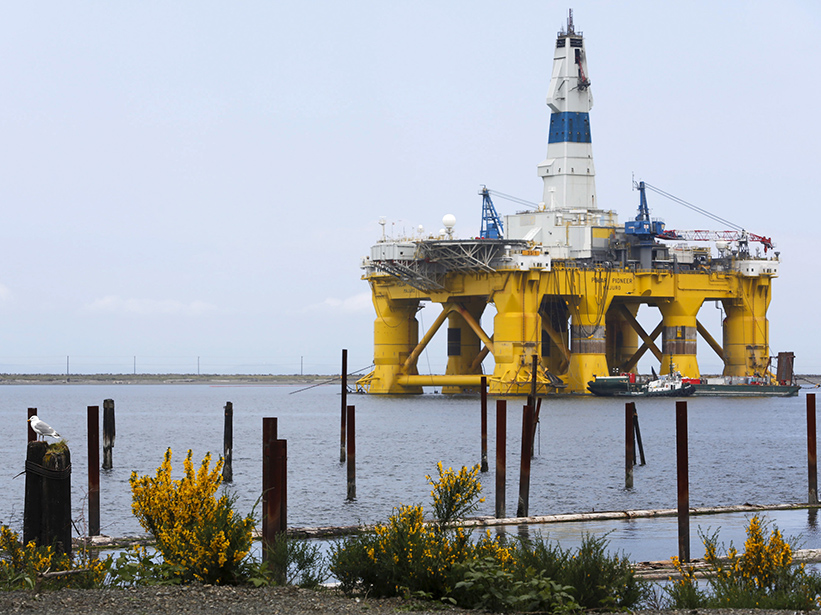Royal Dutch Shell’s September 2015 decision to cease oil exploration activity offshore Alaska has lessened global awareness of Arctic issues, said the U.S. special representative for the polar region in a talk last week in Washington, D. C. “I am discouraged that Shell is not going to be drilling up there in the near future,” Admiral Robert Papp Jr. (retired) told a 25 April forum at the Brookings Institution, a policy think tank.
The oil company’s activity “was visible, something that really drew a lot of attention [and] which provided that sense of urgency to act,” Papp said. Shell’s activities had put Arctic issues, including climate change, preventing oil spills, and balancing environmental protection and resource development, in the spotlight.
In an interview with Eos, Papp also expressed concern about keeping attention on the Arctic following the U.S. presidential election and during a new administration with its own priorities. “Making sure we have continuity [on Arctic issues] and get[ing] the new team up to speed as quickly as possible” rank as probably his highest priority as U.S. special representative for the Arctic, Papp told Eos.
Brookings billed Papp’s talk as a status report on U.S. leadership in the Arctic at the midpoint of the United States’ 2-year chairmanship of the Arctic Council, an intergovernmental forum of eight Arctic nations. Member countries rotate through 2-year stints chairing the body.
Papp described a “sense of urgency” at the White House “that progress has to be made now in advancing our Arctic priorities.”
Papp cited progress in the first year of the U.S. chairmanship on Arctic issues, including raising awareness of the region among Americans outside of Alaska. He noted that U.S. President Barack Obama, who spent 3 days in Alaska last summer, “is personally engaged in Arctic issues” and has focused on the impact of climate change in the Arctic. Papp described a “sense of urgency” at the White House “that progress has to be made now in advancing our Arctic priorities.”
“We must address the impacts of climate change,” Papp added. “There may be no issues with greater long-term consequences for the Arctic.” He said the council “is looking at what a 2°C temperature increase would look like for the Arctic” to prepare for warming impacts and push resilience efforts.
Initiatives Include Scientific Cooperation and Arctic Infrastructure
The United States chairs the council until May 2017. Papp said that before the term ends, the council might finalize a legally binding agreement on scientific cooperation in the Arctic region. It’s also working on a circumpolar infrastructure assessment with recommendations for Arctic states to ramp up telecommunications capacity to support navigation, offshore development, and improved responses to environmental and humanitarian emergencies.
Arctic Council member states also recently provided reports to the council on black carbon, or soot—a global atmospheric pollutant and major contributor to climate change. Among other effects, black carbon darkens snow and ice, increasing energy absorption and melting.
Another council project cited by Papp, an online map of circumpolar renewable energy resources, could help Arctic communities reduce costs and greenhouse gases. Papp added that the United States will lead discussions on Arctic marine cooperation and a regional seas agreement.
Oil Concerns Continue
Any oil spill is “particularly bad in the Arctic.”
Papp said the Arctic Council’s 2013 oil spill preparedness agreement came into effect earlier this year, and he hopes a full-scale exercise takes place soon. He emphasized that despite Shell’s decision to cease its offshore drilling, oil spill prevention remains a high concern.
“The reality is that there are ships passing through the Bering Strait each and every day carrying fuel,” he said. A ship leak may not cause as much damage as a blown-out oil well, he said, but any oil spill is “particularly bad in the Arctic.”
—Randy Showstack, Staff Writer
Citation: Showstack, R. (2016), U.S. Arctic leader: With Shell Oil out, Arctic lost attention, Eos, 97, doi:10.1029/2016EO051635. Published on 2 May 2016.
Text © 2016. The authors. CC BY-NC-ND 3.0
Except where otherwise noted, images are subject to copyright. Any reuse without express permission from the copyright owner is prohibited.

